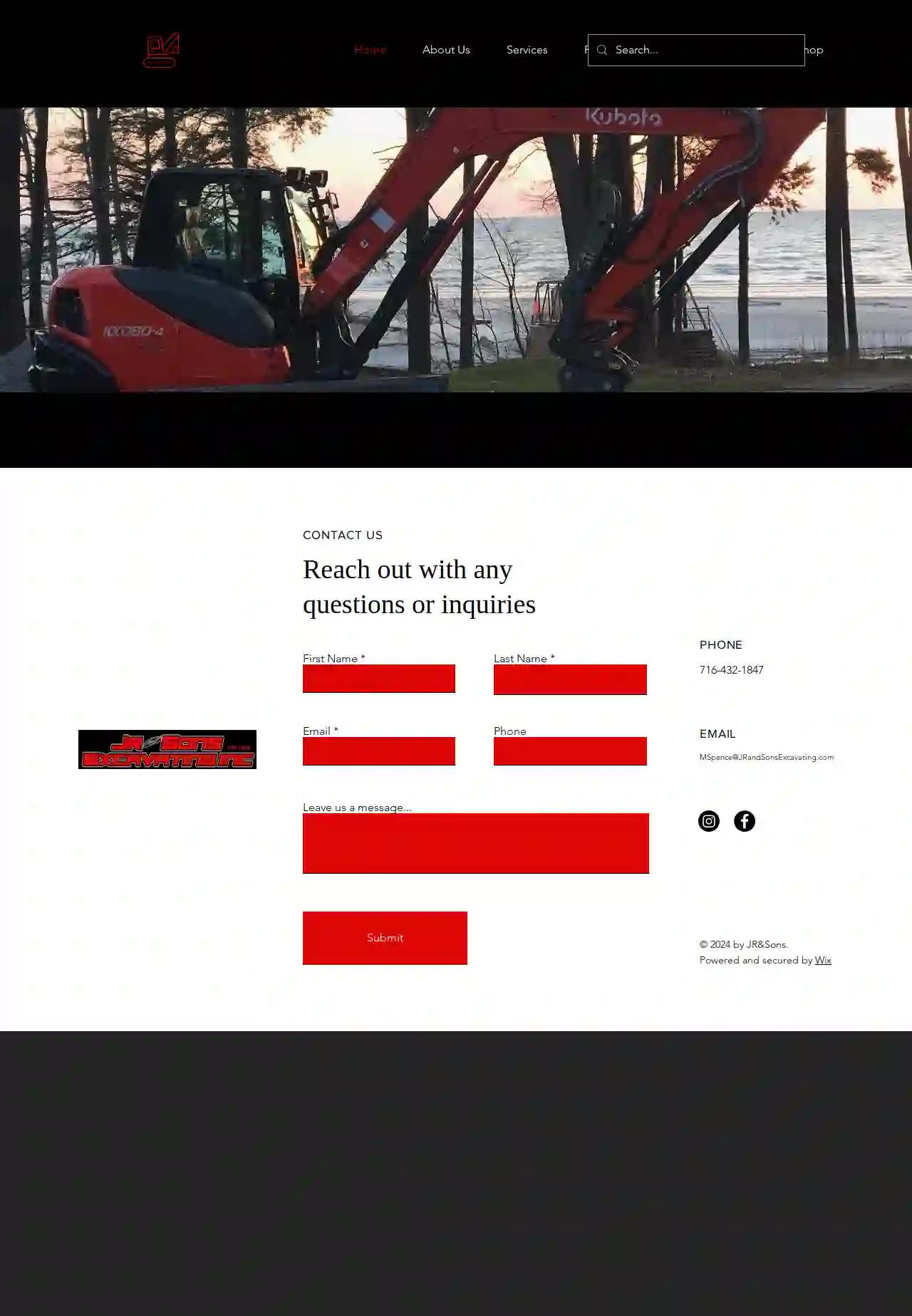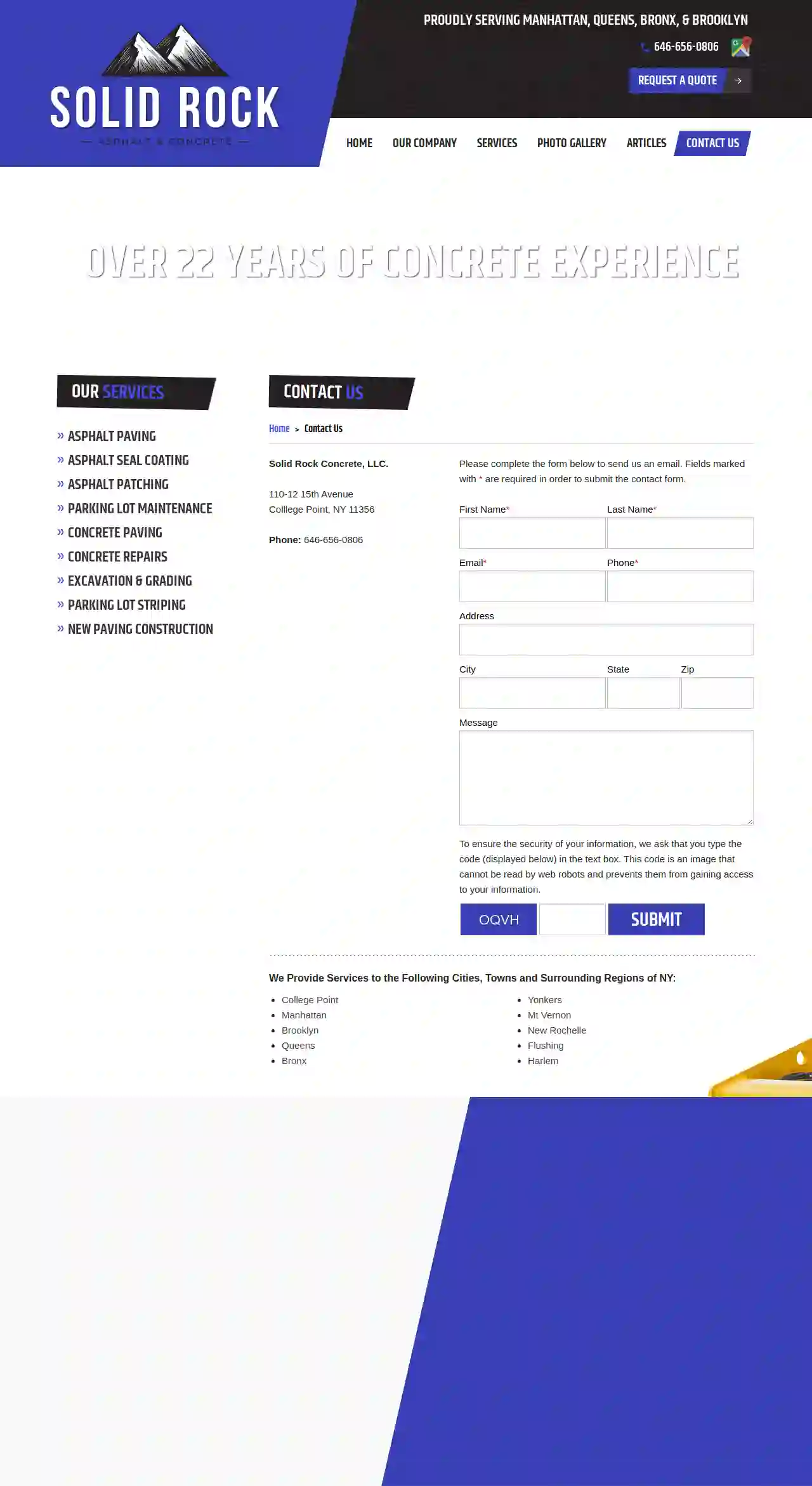Demolition Contractors Viola
Find Demolition Companies in Viola
Receive up to 3 Demolition Company Near Me quotes for your project today! Compare profiles, reviews, accreditations, portfolio, etc... and choose the best offer.

Lehigh Construction Group, Inc.
4.26 reviews4327 S Taylor Road, Orchard Park, 14127, USProviding a full array of Construction, Maintenance and Repair Services to meet Client Construction Needs. A trusted commercial general contractor for Buffalo and WNY delivering construction services with two mainstay principles in mind: WORK HARD and TREAT PEOPLE RIGHT. Our team lives by these principles as we strive to deliver the best customer experience - safely & on-time. Smarter Solutions Providing clients with customized construction building services & emphasizing speed-to-market in an environment of trust, collaboration, and transparency for 40 years. Lehigh Project Building Repairs & Maintenance Lehigh PRO service vans are equipped to handle any small construction job. Lehigh PRO performs thousands of building repairs and facility maintenance jobs as one of Buffalo's trusted building repair and facility maintenance providers. Lehigh Pro Emergency Repairs Lehigh PRO emergency repair services provide quick-response maintenance & repair options. As general contractors, PRO crews take steps to ensure work is completed in a safe and timely manner. Lehigh Industrial Services Industrial Plant Small Construction The Lehigh Industrial Services team is fully equipped to handle any plant construction job and our industrial experience with concrete, steel & metal, masonry and sitework sets us apart. Customers include industrial manufacturing plants, chemical, pharmaceutical, agri-business and warehouse & distribution. Get to Know Lehigh Safety Safety is a Lehigh Core Value. Our philosophy remains unchanged – send everyone home safely to their family every day. We remain on the cutting edge of construction industry safety standards and practices by maintaining our commitment to training and educating employees so they perform in the safest manner possible. History Lehigh Construction Group, Inc. was founded in 1984 by Dave Knauss and Tom Glomb as commercial general contractors for Buffalo and Western New York businesses. Over 40 years later we have grown into one of Buffalo’s most trusted commercial general contractors, offering a full array of commercial construction services. From small scale building maintenance repairs to new-builds & plant additions, Lehigh provides expertise in all aspects of construction. Let us be your commercial general contractor.
- Services
- Why Us?
- Gallery
Get Quote
Buraq Construction Inc
571 reviews1307 Foster Ave, Brooklyn, 11230, USAbout Us Buraq Construction Company was established to offer general construction business in New York City, and has been giving excellent service for more than 10 years. We are the specialists in luxury construction services of the highest standard and safety while keeping up the same standards and quality. Our experienced team is well-versed in navigating the complexities of city regulations and addressing violations efficiently and effectively.
- Services
- Why Us?
- Gallery
Get Quote
Quiver League
531 reviews381 South 5th Street, Brooklyn, NY, 11211, USAbout Quiver League Quiver League is at the forefront of revolutionizing the construction and land surveying industry. With a commitment to excellence and innovation, we specialize in monitoring the stability of adjacent structures during Demolition, Support of Excavation ( SOE), and foundation work, along with delivering comprehensive Land Surveying services. What makes Quiver Unique? Quiver League distinguishes itself within the New York City construction industry by leveraging innovative custom software systems. These cutting-edge tools empower both our field and office teams, facilitating the completion of projects at an unprecedented pace—far surpassing the capabilities of our competitors. Our distinctive software not only ensures efficiency but also prevents overwhelm, enabling us to seamlessly manage even the most demanding workloads. Moreover, it allows us to initiate new projects and field installations with remarkable agility, responding promptly to our client's needs, even on short notice.
- Services
- Why Us?
- Testimonials
- Gallery
Get Quote
JR & SONS EXCAVATING
51 reviewsEden, USAbout JR & Sons Excavating JR & Sons Excavating is a family-owned business with over 30 years of experience in the fields of Excavating and Landscape Architecture. We are dedicated to providing our clients with the highest quality service and workmanship. Our team is equipped with the best equipment and knowledge to safely and effectively complete any project you desire. Owner and Operator, Joe Chimera, focuses great emphasis on every individual's needs so that their project will be executed to the highest standards. Joe and his team are committed to exceeding your expectations and delivering exceptional results. We take pride in our equipment and utilize top products in our industry to ensure your project is completed efficiently and to the highest standards.
- Services
- Why Us?
- Gallery
Get Quote
Shackelford Construction and Hauling, LLC
4.76 reviews350 South Industrial Parkway, Yazoo City, USAbout Us Shackelford Construction and Hauling, LLC is a Mississippi-based construction company, with additional offices in Houston, TX, and yards located in New Mexico, Texas, South Carolina, and Georgia. We specialize in a range of services including land clearing, demolition, excavation, grading, soil stabilization, storm drainage, stone placement, concrete, building, and site maintenance for the railroad, oilfield, energy, industrial, and large commercial industries. Our top priorities are safety and customer satisfaction. Shackelford is licensed to operate in 30 states across the United States on individual projects up to 55 million dollars. Our client list ranges from all class 1 railroads and privately-owned short lines to oil and gas, chemical, industrial, and energy. Our Mission Finish every job ahead of schedule and without incident, allowing our customers the earliest possible financial return on their investment. Team Jay Shackelford Owner 38 years of experience Hunter Shackelford Operations Manager 26 years of experience Alfonzo Hernandez Safety Manager 26 years of experience Reeves Shackelford Manager of Estimating & Project Management 27 years of experience Clint Shackelford Business Development 14 years of experience Reeves Shackelford Estimating & Project Management
- Services
- Why Us?
- Our Team
- Gallery
Get Quote
LONG ISLAND EXCAVATION
240 Elwood Road, East Northport, 11731, USBongiorno's Contracting Professional groundwork and excavation service from one of the leading construction excavation companies in New York. There is a lot more to groundwork than just moving earth. Our extensive experience ensures that all concerns and laws relating to the environment, civil engineering and health and safety are taken into account to give you peace of mind. Reasons for Choosing Our Company Established 70 years in business on Long Island Licensed and Insured Home Improvement Contractors No Sub-Contracting, All the work is done by our team Many Recent Job References Family Owned and Operated Using only quality materials Forms of Payments Excepted: Credit Cards (VISA, Mastercard, American Express, Discover), Personal checks, Cashier Checks. Suffolk County Home Improvement License 9615-H Our Team (Left to Right) Charles F. Bongiorno 111 - Charles F. Bongiorno Jr. - Charles F. Bongiorno Sr. Corporate Office Chuck Bongiorno As. Bs. Ms. 240 Elwood Road East Northport, New York 11731 Business Phone: (631) 368-9086 Cell Phone: (631) 848-3190 Yard: (631) 368-8123 Email: [email protected]
- Services
- Why Us?
- Our Team
- Gallery
Get Quote
Apex Excavating & Construction Services, LLC
517 reviewsClay, USWelcome to Apex Excavating & Construction Services, LLC We are a team of experienced professionals committed to delivering top-quality services to our clients. Our company specializes in excavation, site preparation, and construction services in Greensboro & The Piedmont. We hold an unlimited general contractors license, so we can work on any project, no matter the size and scope. If you want to build ANYTHING, we can help. We may have started in site development, but our customers kept asking if we could build their driveway or help stand up a shed in their yard. So we added construction services to our offerings. We started small and as we grow, we strive to maintain our small company feel. By strategically partnering with skilled tradesmen in North Carolina, we maintain the flexibility of a small business, while being able to scale to meet the demands of big projects. Our mission is simple: To provide our customers with exceptional service, quality workmanship, and a smooth construction experience from start to finish. Whether you’re a homeowner, business owner, or contractor, we are committed to delivering outstanding value and exceeding your expectations in everything we do. We’re Apex Excavating & Construction Services, a family owned and locally operated construction and site development company in Greensboro, NC. We’ve been tearing up the ground and building things in the Piedmont for years, and we’re proud to be a part of the community. We’re committed to providing our customers with the highest quality services at a fair price. We’re also committed to safety, and we take every precaution to ensure that our employees and customers are safe on the job site.
- Services
- Why Us?
- Gallery
Get Quote
Carolina Excavation Specialties LLC
528 reviewsGarner, NC, 27529, USUnparalleled Excavation Services & Solutions The Excavation & Grading Team You Can Rely On! PREMIER EXCAVATION CONTRACTOR Proudly Serving Apex, NC; Chapel Hill, NC; Raleigh, NC; and Youngsville, NC If you’re looking for a hardworking, dedicated team of excavation and grading contractors to tackle your excavation job, you’ve come to the right place! Carolina Excavation Specialties LLC is an authority in the industry that provides a comprehensive list of excavation services and more for residential and commercial properties throughout the Apex, NC; Chapel Hill, NC; Raleigh, NC; and Youngsville, NC areas. These services include: ● Excavation ● Utilities ● Septic System Install & Repairs ● Culverts, Ditching & Storm Drainage ● Demolition Services ● Erosion Control ● Retention Ponds ● Grading ● Gravel Pads & Driveways ● Land Clearing ● Foundations ● Retaining Walls ● Roof Drainage ● Asphalt/Concrete More About Us
- Services
- Why Us?
- Our Team
- Testimonials
- Gallery
Get Quote
Solid Rock Concrete, LLC
110-12 15th Avenue, College Point, 11356, USSolid Rock Concrete, LLC. Solid Rock Concrete is a family-owned and operated business with over 22 years of experience in the concrete industry. We are committed to providing our clients with high-quality concrete services at competitive prices. We specialize in a wide range of concrete services, including asphalt paving, asphalt seal coating, asphalt patching, parking lot maintenance, concrete paving, concrete repairs, excavation & grading, parking lot striping, and new paving construction. We are proud to serve Manhattan, Queens, Bronx, and Brooklyn. Our team of experienced professionals is dedicated to providing our clients with the highest level of customer service. We are committed to working with our clients to ensure that their projects are completed on time and within budget. We are also committed to using the latest technology and equipment to ensure that our work is of the highest quality. We are fully licensed and insured, and we are committed to providing our clients with a safe and professional work environment. We are also committed to being environmentally responsible and using sustainable practices whenever possible. If you are looking for a reliable and experienced concrete contractor, please contact us today for a free estimate. We look forward to hearing from you!
- Services
- Why Us?
- Gallery
Get Quote- Mu
Munson Excavating and Construction
4.210 reviewsBronx, US- Services
- Why Us?
- Gallery
Get Quote
Over 22,076+ Excavation Companies registered
Our excavation providers operate in Viola & beyond!
ExcavationHQ has curated and vetted Top Excavation Businesses in and around Viola. Find a trustworthy pro today.
Frequently Asked Questions About Demolition Contractors
- Enclosure: Sealing off the asbestos-containing material to prevent fiber release.
- Encapsulation: Coating the asbestos-containing material with a sealant to bind the fibers.
- Removal: Carefully removing the asbestos-containing material and disposing of it safely.
- Clear the Site: Remove all furniture, appliances, personal belongings, and any valuable items from the structure.
- Secure the Perimeter: Fence off the demolition area to prevent unauthorized access and protect surrounding property.
- Disconnect Utilities: Arrange for the disconnection of electricity, gas, water, and other utilities servicing the building.
- Hazardous Material Abatement: If asbestos, lead paint, or other hazardous materials are present, have them professionally removed before demolition begins.
- Notify Neighbors: Inform your neighbors about the demolition schedule to minimize disruptions and address any concerns.
- Obtain Permits: Ensure all necessary demolition permits are in place before starting work.
What are the different methods of asbestos abatement?
What is the difference between demolition and deconstruction?
Demolition: Typically involves bringing down a structure quickly and efficiently, often using heavy machinery and potentially explosives. The primary goal is to clear the site.
Deconstruction: Focuses on carefully dismantling a building piece by piece to salvage reusable materials. It prioritizes minimizing waste and environmental impact, often involving manual labor and specialized tools.
The choice between demolition and deconstruction depends on the project's objectives, budget, and environmental considerations.
How do I prepare my property for demolition?
What is a demolition bond?
What are the different methods of asbestos abatement?
- Enclosure: Sealing off the asbestos-containing material to prevent fiber release.
- Encapsulation: Coating the asbestos-containing material with a sealant to bind the fibers.
- Removal: Carefully removing the asbestos-containing material and disposing of it safely.
What is the difference between demolition and deconstruction?
Demolition: Typically involves bringing down a structure quickly and efficiently, often using heavy machinery and potentially explosives. The primary goal is to clear the site.
Deconstruction: Focuses on carefully dismantling a building piece by piece to salvage reusable materials. It prioritizes minimizing waste and environmental impact, often involving manual labor and specialized tools.
The choice between demolition and deconstruction depends on the project's objectives, budget, and environmental considerations.
How do I prepare my property for demolition?
- Clear the Site: Remove all furniture, appliances, personal belongings, and any valuable items from the structure.
- Secure the Perimeter: Fence off the demolition area to prevent unauthorized access and protect surrounding property.
- Disconnect Utilities: Arrange for the disconnection of electricity, gas, water, and other utilities servicing the building.
- Hazardous Material Abatement: If asbestos, lead paint, or other hazardous materials are present, have them professionally removed before demolition begins.
- Notify Neighbors: Inform your neighbors about the demolition schedule to minimize disruptions and address any concerns.
- Obtain Permits: Ensure all necessary demolition permits are in place before starting work.